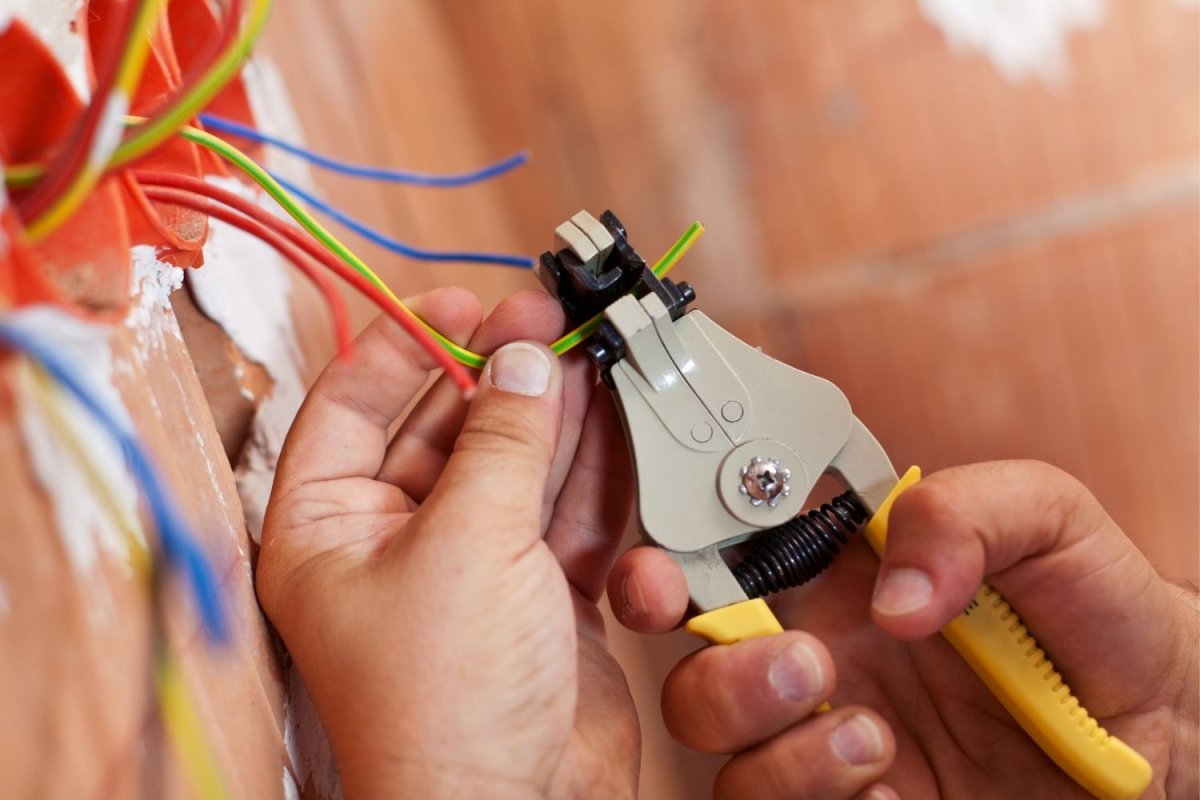We may earn revenue from the products available on this page and participate in affiliate programs. Learn More ›
Highlights
- Homeowners can expect to pay between $561 and $2,308 to rewire a house, with the national average cost coming in at $1,432.
- The exact cost to rewire a house depends on factors such as the size and age of the home, the scope of the project, the type of system in the home, and the local labor rates.
- Some of the most frequent signs that a home needs to be rewired include aging wiring, discolored outlets, flickering lights, burning smells, and frequent tripping of the circuit breaker.
- House rewiring is not a DIY job; and in some areas, it’s forbidden for anyone but a licensed electrician to work on wiring since it can be a very dangerous task for an inexperienced homeowner.
As technology advances, so does the need to power new appliances, gaming computers, space heaters, and all the electrical peripherals found in today’s homes. Older wiring that has not been upgraded is often insufficient for running these items. The result is tripped breakers due to overloaded electrical circuits and poor performance. Old wiring can also be a fire hazard, so the cost to rewire a house should be considered an investment in both the home and its residents’ safety.
Bringing an older house’s wiring up to code is usually one of the first improvements a homeowner seeks to do. Depending on where the home is located, its size, and other factors, such as wall type, electrical rewiring will usually cost $561 to $2,308, but the total bill may rise to over $5,000 for special circumstances. Nationally, most homeowners will pay about $1,432 on average. A local electrician will be necessary since this isn’t a DIY project.
Factors in Calculating the Cost to Rewire a House
The final cost to rewire a house depends on many factors, including how many rooms need rewiring, the type of rooms, and whether the home will also need to upgrade the electrical service panel. In general, wiring a house costs about $3 to $5 per foot, and the following considerations will affect the cost.
Home Size and Age
The size of the house is a significant factor in estimating the cost to have it rewired. Building codes require a certain number of outlets based on wall space, so the bigger the house, the more outlets. Rewiring a small 1,000-square-foot home typically ranges from $3,000 to $5,000, while rewiring a home with 3,000 square feet of living space could cost $9,000 to $15,000.
The age of the house is also a factor. Homes built in an era before drywall was used often have lath-and-plaster walls, which make it challenging to fish wires through wall spaces, thereby increasing the cost of installation.
Scope of the Project
Rewiring a house most often focuses on upgrading the electrical wires that power the outlets, lights, and switches, but in some cases, it can encompass additional wiring projects. Other types of wiring, such as installing new telephone jacks, adds between $50 and $240 per jack to the cost. The number of outlets and switches is also a consideration; adding an outlet or switch costs between $75 and $275 each.
Type of System and Material
Older homes often have 60-amp electrical systems that aren’t sufficient for powering today’s appliances and technology. Larger 200-amp systems are typically installed during rewiring and can result in the project costing about $1,300 to $3,000. Keep in mind the national average for whole-house rewiring (including upgrading to a 200-amp system) is about $1,430.
Labor and Permits
The longer it takes to complete the rewiring project, the more you’ll pay. Labor costs vary from community to community, but in general you can expect to pay about $40 to $100 per hour per worker.
Pulling a permit is almost always required, and the local building authority may want to inspect the electrician’s work to ensure it’s up to code. Permits start around $250 but can run as much as $500 or more, depending on the project’s scope.
Accessibility
Wiring is a relatively simple project during new construction because the stud spaces are open, allowing the electrician to easily run the wires. It’s more difficult in an existing home where the studs are covered by plaster or drywall. It can be challenging to install the wires without tearing out existing walls. In a large, older home where it’s difficult to install new wiring, the project’s cost could run as high as $30,000.
Electrical Panel Upgrade
New electrical wiring must be connected to a suitable service panel. Building codes for most new homes require the installation of a 200-amp service panel. A small, older home that’s being rewired might get by with a 100-amp panel. A 100-amp or 200-amp panel costs $50 to $200, and a 400-amp panel runs $400 to $500. These prices are for standard contractor-grade panels, and higher-end finishes will tack more onto the cost. When it comes to rewiring, the bulk of the cost is in labor.
Types of Rooms That Are Being Rewired
Electrical code varies by room. More outlets are necessary to run power-hungry appliances in a kitchen, such as fridges, ovens, and stovetops, so they cost more to rewire than do bedrooms. In addition, both kitchens and bathrooms require installing ground fault circuit interrupters (GFCI) to protect residents from shocks caused by the presence of water. Rewiring a bedroom may cost $790 to $3,705, while rewiring a bathroom averages $240 to $3,710, and installing new wire in a kitchen runs $620 to $2,855.
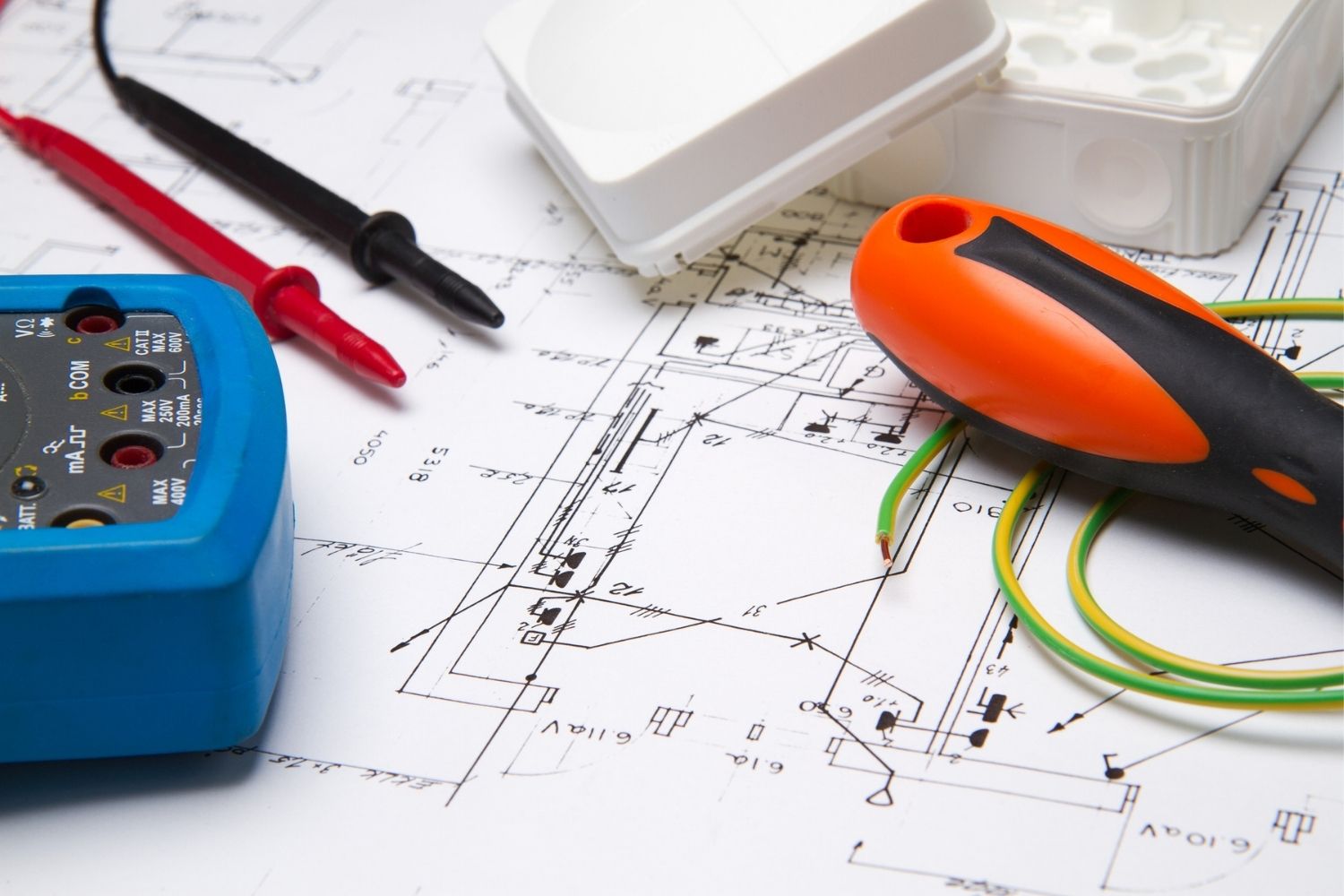
Additional Costs and Considerations
All remodeling projects are subject to unforeseen costs, and home rewiring is no exception. Cutting away portions of walls to run wires is often necessary, and any time the inside of a wall is exposed, there’s a risk of finding rot, mold, or other damage that should be addressed. The following considerations apply to many rewiring projects and may impact the final cost.
Inspections
Many communities require inspections of both new construction and remodeling wiring systems. The cost is generally included in the permit price, which ranges from $200 to $900. Inspections take place after the electrician runs the new wires but before outlets and switches are connected.
Opening Walls
It can be virtually impossible in older homes with plaster walls to fish new wires up through the closed wall spaces. If this is the case, the homeowner will need to hire an additional contractor (not an electrician) to open the walls and repair them after the electrician completes the wiring. For 1,250-square-foot homes, opening walls and rewiring costs $7,500 to $15,000. For homes with minimal access or much larger homes, the price could increase up to $30,000.
Upgrades and Improvements
Upgrading a home’s wiring typically ranges from $526 to $2,010, and a good deal of the reason for such a vast cost difference depends on the type of upgrades and improvements necessary. For example, updating a newer home that only needs a service panel upgrade won’t cost nearly as much as rewiring an older house that still has antiquated knob-and-tube wiring.
Cleaning
If the rewiring project involves opening walls, it can create quite a mess—leaving piles of drywall or plaster and lath to clean up. Fortunately, site cleanup and debris removal are usually included in the wall contractor’s bid price, but it never hurts to ask in advance. A local electrician may not provide for cleanup in his bid. Electricians typically drive panel-type vans, and they don’t have the means to haul away the debris.
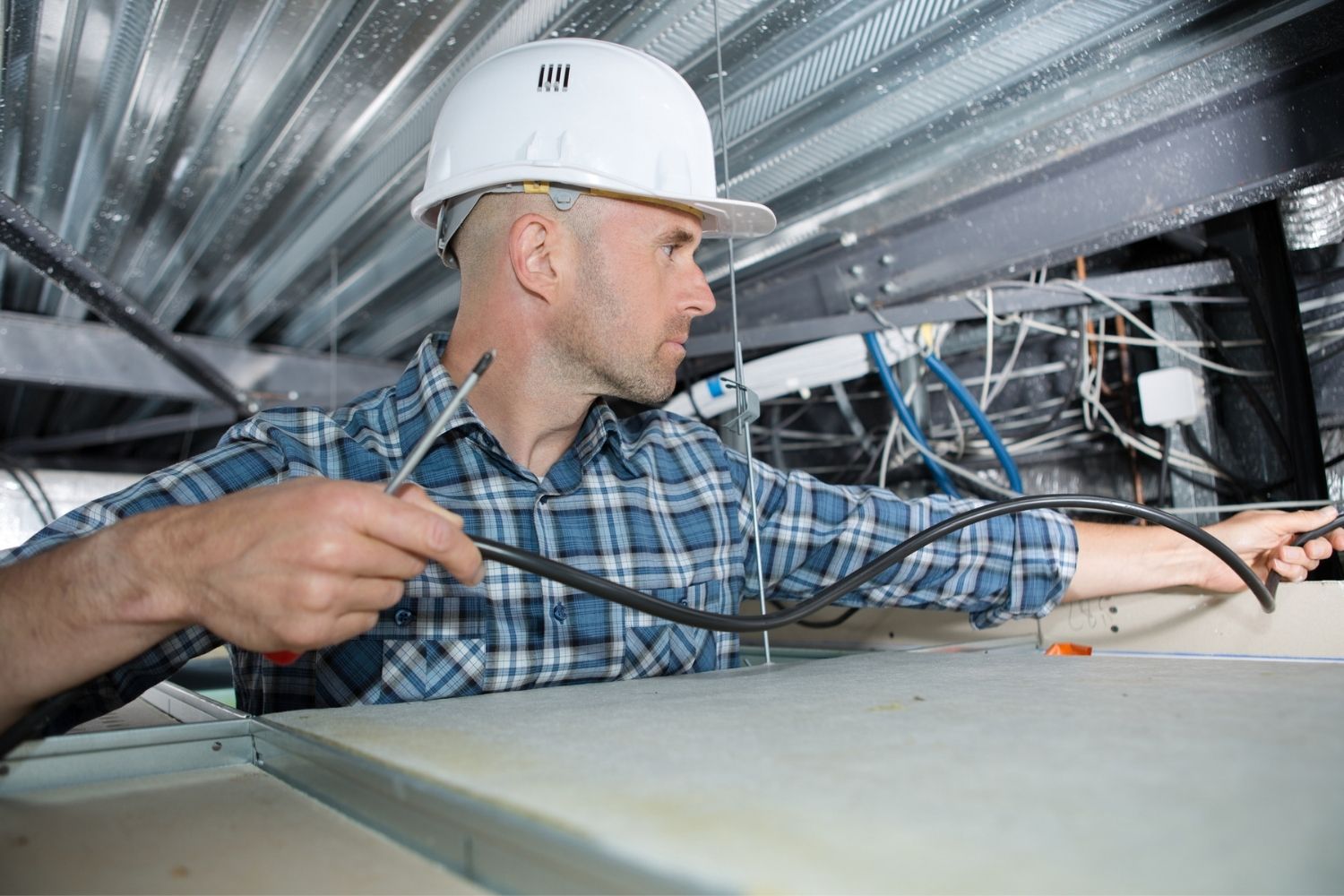
Do I Need to Rewire My House?
Convenience isn’t the only reason for rewiring; safety is a significant factor as well. The cost to rewire an entire house ranges from $561 to $2,308, depending on many factors. The following warning signs point toward the need to have the house rewired or specific electrical problems corrected.
Old Wiring
Decades ago, a home’s wiring was often limited to one outlet and one switch per room, plus a single overhead light. Electrical wiring was in its infancy at that time, and there was no need for additional outlets. However, today’s homeowners have access to many electrical devices, and updated wiring is vital to their performance. Old wiring simply isn’t adequate in today’s homes.
Discolored Outlets and Switches
Black or brown areas on switches or outlets—or melted spots—are a sure sign that something’s wrong. The staining can be caused by loose wiring or plugging in an appliance where the plug doesn’t make good contact, resulting in an arc or spark that singes the outlet cover. The problem is often in the outlet or the switch itself rather than in the wiring. Rewiring outlets can cost $100 to $150 apiece.
Burning Smell
Burning electrical wires have a distinctly acrid smell, and if you smell it, unplug everything from the outlet or turn off the switch. Burning smells occur for the same reasons discoloration occurs, and sometimes staining is visible on the outlet cover. If the wires in the wall have melted, however, the smell may be the only sign. Flip off the breaker that serves the switch or outlet, and don’t use it again until an electrician checks out the problem.
Flickering Lights
Lights flicker for various reasons, including loose bulbs and intermittent power that may be the electric company’s fault. However, they can also be caused by loose wiring, so if you’ve checked the bulbs, call your electric company to ask whether they’re experiencing intermittency. The presence of flickering lights doesn’t necessarily mean you need to have the whole house rewired, but if you can’t resolve the problem, you should have an electrician out to take a look. Expect to pay $40 to $100 per hour for an electrician’s services.
Frequent Circuit Breaker Tripping
One of the most common signs that the existing wiring isn’t up to snuff is circuit breakers that regularly trip. This is a sign that you’re trying to use more electricity than the wiring or service panel can deliver. If you need to have an entire home rewired, the national average is $1,402, depending on the house’s size and age. If you need a single circuit added, expect to pay $100 to $150 on average.
Other Warning Signs
During the 1960s and 1970s, aluminum wiring was installed in many homes. Unfortunately, aluminum wiring presents a fire risk. If your home was built during this period and the wiring has not yet been updated, it’s a good idea to have it done now. Too few outlets is another sign it’s time to update the wiring. Older homes may have had just one outlet per room, while today’s building code usually requires outlets installed every 6 feet apart on a wall.
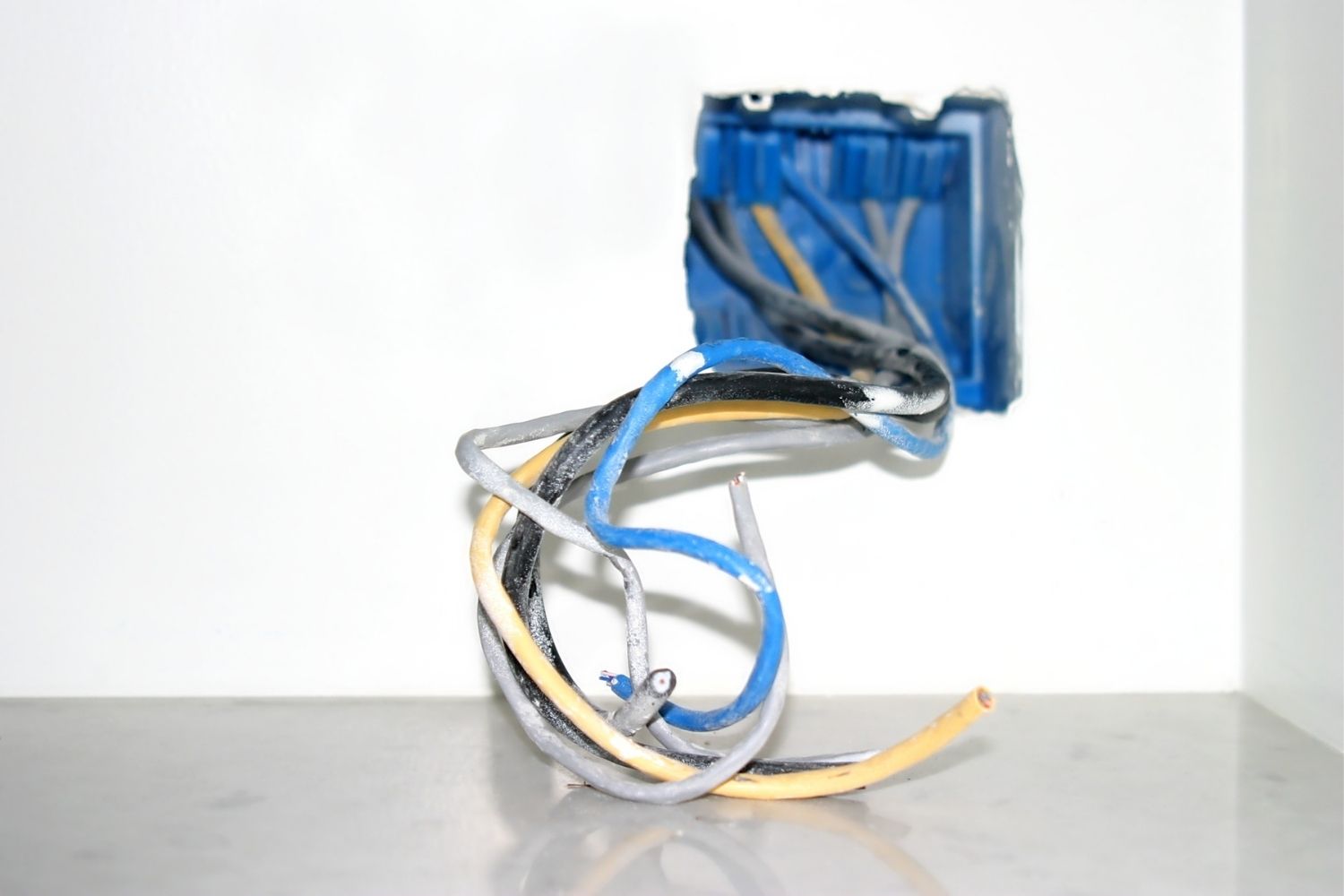
Rewiring a House: DIY vs. Hiring a Professional
In many communities, rewiring a house is not a DIY option. Just as charging an air conditioner with freon or connecting gas lines is usually restricted to professionals, so is running new wiring or installing a new service panel. Things like installing a new ceiling light or replacing existing switches with new switches may be permitted, but rewiring a home involves knowing what type of circuit (15-amp or 20-amp) is required in different places in the house. Rewiring also consists of connecting the wires to the service panel, which only a licensed electrician should do.
The best option is to hire a local electrician to do the work. An electrical company will generally charge between $65 and $85 per hour per worker. Depending on the size and scope of the project, it usually takes from 3 to 10 days to wire a house.
How to Save Money on the Cost to Rewire a House
Because DIY-ing a rewiring project is out of the question, many homeowners look for other ways to save money while still hiring a professional to do the work. Consider the following methods to shave a bit off the cost and still enjoy newer wiring benefits (and added safety).
- Avoid opening walls whenever possible. This might involve running the new wires in conduit that can be painted to match the wall color. The repairs required to fix the walls if they’re opened can add up to 25 to 30 percent of the project cost.
- Have all your wiring needs taken care of at the same time. Sure, it’s cheaper to wire a single room rather than a whole house, but if you plan to have the entire home rewired eventually, you can usually save money by having the electrician do it all at once.
- If the wiring isn’t especially old, consider adding a few new circuits rather than rewiring the entire house.
- Choose contractor-grade panels, especially if the panel won’t be somewhere overly visible.
- If the job requires opening walls and you’re an experienced DIYer, ask if you can handle the wall replacement or repair yourself.
- If the electrician runs wires along the wall surface, paint over the wires instead of hiring someone.
- After rewiring, you’ll likely need to update many of your home’s fixtures. This can be another significant cost not included in the price of rewiring, but it’s an easy place to save money by going for cheaper fixtures.
- Find out when your home was built or when it was last rewired. You may be dealing with an electrical problem that could be unrelated to the age of the home’s wiring.
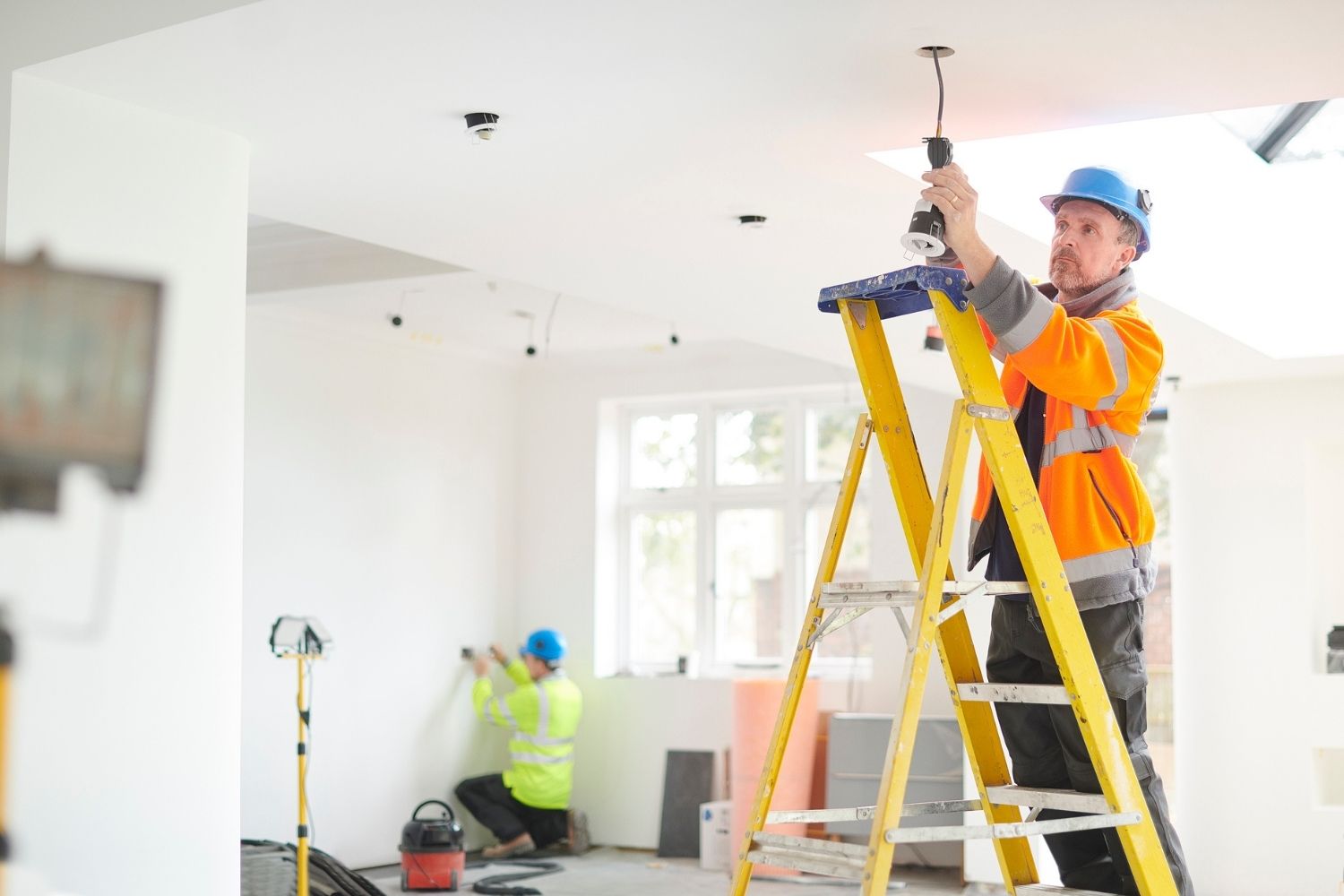
Questions to Ask About Rewiring a House
In addition to the most common question—how much does it cost to rewire a house—asking the following questions will help ensure you get the best job for the price.
- Could you give me a bid instead of an estimate? A bid is a firm price the electrician agrees not to exceed, while an estimate is only a ballpark figure that could—and often does—increase.
- Would you itemize your bid? You likely know that it’s a good idea to get bids from more than one electrician, but unless you know exactly what each electrician includes in the bid, going with the lowest bid might not be the best choice.
- Is financing an option? Since having a home rewired can be pricey, you may not have enough cash to pay out of pocket. Some electrical companies will finance the cost over 2 or 3 years.
- How many people will this job take?
- How long will this job take? Do I have to leave my house?
- Do you need to open up walls?
- How long have you been in business?
- Do you have references?
- Are you licensed and insured? Some states require electricians to be licensed and insured, while others might not. Check your state regulations.
FAQs
Whether your home is a small ranch-style house or a large rambling Victorian, updating wiring is optimal for running today’s appliances. If you’re considering having your house rewired, you likely have a few questions.
Q. How much does it cost to rewire a 1500-square-foot house?
The bigger the house, typically, the more it will cost to have rewired. The average cost for rewiring a house is $1,432, but this price can go up or down depending on the age and condition of the home.
Q. Can I rewire a house without removing drywall?
An electrician may run the main wires between floor joists or between attic rafters and then fish the wires through the wall studs to the switches and outlets. Alternatively, the electrician can install conduit along the wall’s surface and run the new wires through the conduit tube. The conduit will be visible with the latter method, but the look can be minimized by painting it to match the wall.
Q. Is rewiring a house covered by insurance?
It may be—it depends on the individual policy. Some insurers feel that new wiring will reduce fire risk, but you will still need to pay the deductible portion.
Q. When should I rewire my house?
If your home’s wiring is old and you cannot run multiple appliances without flipping a breaker, it’s probably time to have the house rewired.

